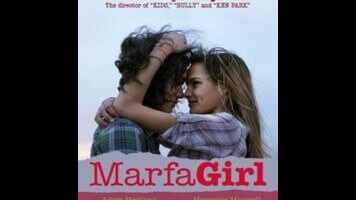Two decades after he turned Harmony Korine’s screenplay for Kids into a minor sensation, Larry Clark is still doing his unabashedly pervy Larry Clark thing. Marfa Girl, a film he made three years ago and initially self-distributed on his website, is now getting a belated theatrical release, and it checks off every box on the director’s list of personal obsessions: skateboards, ridiculously skinny teenagers, gratuitous sex, really bad kissing, non-professional actors who look like deer caught in the headlights, corrupt authority figures, etc. Auteurists tend to love Clark, or at least respect him, simply because his films are so blatantly his own—he’s identifiable at a glance. Unlike, say, Russ Meyer, however, Clark rarely demonstrates any formal dexterity, and he absolutely never has anything resembling fun with his efforts to reconceive desire as art. His films are shoddily constructed voyeuristic exercises clumsily disguised as (im)morality plays.
Like most of Clark’s work, Marfa Girl doesn’t really have a story—just a collection of incidents that abruptly escalate to a moment of tragedy at the end. Set in the small border town of Marfa, Texas (population 1,981 in the most recent census), it divides its attention among three main characters: two ostensibly admirable, one utterly despicable. Adam (Adam Mediano) is the requisite razor-thin teenage boy who serves as the closest thing to the film’s protagonist, though he doesn’t want to do much of anything but fuck his vacuous girlfriend (Mercedes Maxwell), cheat on her with a slightly older woman (Indigo Rael) whose husband is in prison, and hang out watching his musician friends rehearse. The unnamed title character (Drake Burnette), an artist-in-residence, lounges around naked sketching equally naked dudes and has hilarious “philosophical” conversations with Adam, when she isn’t instructing him to get good at eating out girls so he can please her next year when he reaches the age of consent. (To her credit, she at least recognizes that having sex with him is illegal.) These low-key interactions are juxtaposed with the wanton cruelty of Tom (Jeremy St. James), a border-patrol officer who lusts after Adam’s mother (Mary Farley), but misses no opportunity to humiliate any Mexican-Americans he finds.
Compared to earlier Clark films like Kids and Ken Park (also written by Korine), Marfa Girl is relatively tame, sexually—the characters constantly roll around naked, and there’s one notable erection (which is refreshing, given American cinema’s timidity regarding penises, though the context here is bizarre), but nothing terribly explicit. All the same, this feels more like porn than any solo feature Clark has ever made, in part because his non-pro cast is unusually wooden even by his standards. An early scene in which Adam falls asleep in class and is given a spanking by his female teacher (Lindsay Jones) plays almost exactly like the first scene between Dirk Diggler and Amber Waves in Boogie Nights, except that Amber Waves is a better actress. And while it’s not clear whether the dialogue is scripted, improvised, or a combination of the two, it really doesn’t matter when people are saying things like, “If people fucked more, there would be less war” (Marfa Girl) or, “I want your hate paste!” (Tom, trying to rape Adam near the end). The movie’s saving grace is its occasional digressions, primarily involving a New Age healer (Tina Thérèse) who specializes in “sound healing.” These sequences are still slightly clumsy, but at least they offer something more than blunt, racist caricatures and libidinous meandering.

